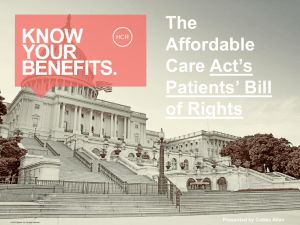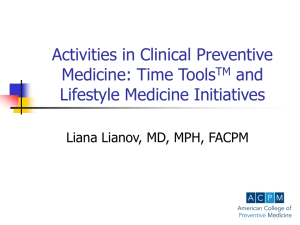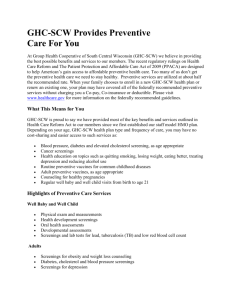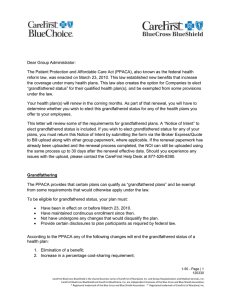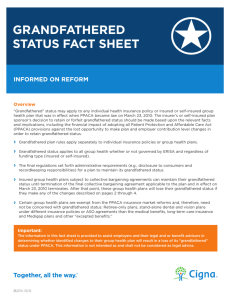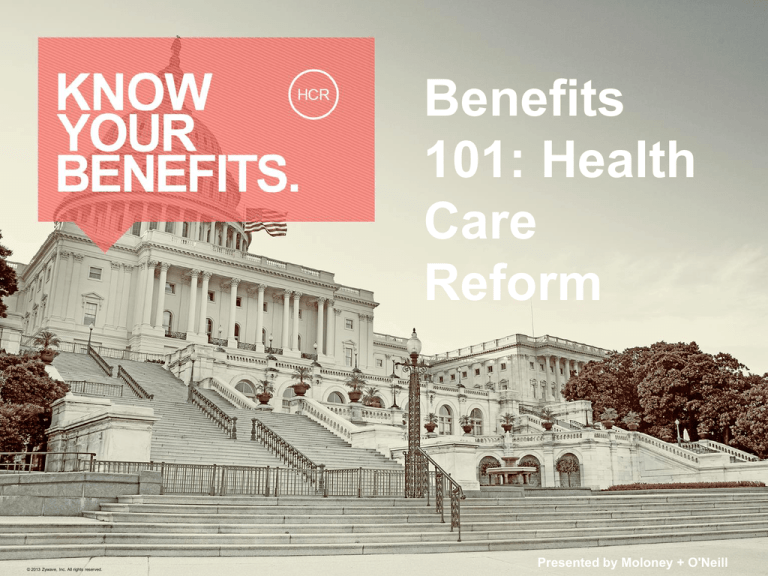
Benefits
101: Health
Care
Reform
© 2013 Zywave, Inc. All rights reserved.
Presented by Moloney + O'Neill
What is Health Care Reform?
• Biggest overhaul of the United States’ health
care system since Medicare and Medicaid in
1965
• Requires most individuals to obtain health care
coverage
• Requires insurance companies and employers
to provide consumer protections related to
health coverage, like covering pre-existing
conditions and not charging more for coverage
based on gender
Key Elements of Health Care Reform
• Free preventive care
– Most health plans are required to cover certain
preventive care services at no cost to you
• The individual mandate
– People who can afford health insurance but don’t have
coverage in 2014 may have to pay a fee, and will have
to pay for all of their health care
• The Health Insurance Marketplace
– A new way to find quality health coverage
– Can help if you don’t have coverage now or if you have it
but want to look at other options
• The Affordable Care Act’s Patients’ Bill of Rights
– The ACA offers new rights and protections that make
coverage fairer and easier to understand
Preventive Care
• Preventive care refers to measures taken to
prevent individuals from contracting diseases.
• Under the ACA, most private health plans must
provide coverage for a range of preventive
services and may not charge any copayments,
deductibles or coinsurance to patients receiving
preventive care.
• Preventive care includes:
– Medical tests, immunizations, screening tests,
preventive medications and any other services that
would prevent disease
Preventive Care Services
• Adults
– Physical examinations, immunizations, blood pressure
screenings, colon caner screenings, HIV and STI
screenings
– Counseling and treatment for alcohol, tobacco, drugs
and obesity
• Women
– Well-woman visits, Breast Cancer Genetic Test
Counseling (BRCA) test, mammograms, cervical cancer
screenings, osteoporosis, certain pregnancy and postbirth services, contraceptives
• Children
– Newborn care, many age-specific medical, behavioral
and developmental assessments for children up to 18
years old
• Medicare recipients also have some no-cost
preventive services available
Grandfathered Plans
• Grandfathered plans are those that were in
existence on March 23, 2010, and have stayed
basically the same
• Grandfathered plans do not have to cover
preventive care for free
• Check with your insurance company or benefits
administrator to find out whether your plan is
grandfathered
The Individual Mandate
• Requires most people to have “minimum essential
coverage” health insurance
• Beginning in 2014, most individuals must either
have health insurance that meets minimum
standards of coverage or pay a penalty when filing
tax returns
• Minimum essential coverage is defined as:
– Any Marketplace plan, or any individual insurance plan
you already have
– Any employer plan (including COBRA), with or without
“grandfathered” status, including retiree plans
– Medicaid
– Medicare
– The Children’s Health Insurance Program (CHIP)
– TRICARE and other veterans health care programs
– Peace Corps Volunteer plans
How much is the tax penalty?
• The annual tax penalty for not having minimum
essential coverage depends on the age and number
of dependents in your household.
• The penalty will be the greater of a flat dollar
amount per individual or a percentage of the
individual’s taxable income, and increases over the
next three years.
The Health Insurance Marketplace
• Health Insurance Marketplaces (Exchanges)
create alternative markets for buying health
insurance.
• They will:
– Offer a choice of different health plans
– Certify plans that participate
– Provide information to help consumers understand
their coverage options
• Individuals can purchase insurance through a
Marketplace if they are:
– Not currently incarcerated
– A lawful U.S. citizen or resident
– Living in the service area of the Marketplace
What types of plans will be available?
There are four categories of Marketplace
insurance plans available to everyone and one
specialized plan available to select individuals:
–
–
–
–
–
Bronze
Silver
Gold
Platinum
Catastrophic plans available to people under 30 and
those with very low incomes
What will the plans cover?
All plans will cover a comprehensive package of items
and services known as essential health benefits:
1.
2.
3.
4.
5.
Ambulatory patient services
Emergency services
Hospitalization
Maternity and newborn care
Mental health and substance use disorder services,
including behavioral health treatment
6. Prescription drugs
7. Rehabilitative and habilitative services and devices
8. Laboratory services
9. Preventive and wellness services and chronic disease
management
10. Pediatric services, including oral and vision care
Marketplace Subsides
• Some people can save money in the
Marketplaces in three ways:
– Subsidized coverage, available to some individuals
and families with incomes up to 400 percent of the
federal poverty level
– Reduced out-of-pocket costs (like deductibles,
coinsurance and copayments), available to some
individuals and families with incomes up to 250
percent of the poverty level
– Expanded Medicaid eligibility, available to some
individuals and families with incomes up to 133
percent of the federal poverty level
Enrolling in the Marketplace
• Open enrollment starts Oct.1, 2013, and ends
March 31, 2014
• Medical coverage begins as early as Jan. 1,
2014
• Three ways to apply for Marketplace coverage:
– Online at healthcare.gov
– By mail
– In person
• You can enroll with the help of a Navigator or
other qualified helper
Employer Coverage vs. Exchange
Coverage
• The coverage offered through Moloney +
O'Neill Benefits is likely more affordable than
coverage purchased through the Exchange
• Exchange coverage is a good option if you are
ineligible for coverage through Moloney +
O'Neill Benefits
The Affordable Care Act’s Patients’
Bill of Rights
• The Patients’ Bill of Rights is designed to
summarize health coverage protections
embedded within the ACA. Protections include:
–
–
–
–
–
–
No pre-existing condition exclusions
No arbitrary rescissions of insurance coverage
No lifetime dollar limits on coverage
Restricting annual dollar limits on coverage
Allowing participant choice of a health care provider
Granting access to emergency services
No Pre-Existing Condition Exclusions
• Health plans cannot deny coverage based on
pre-existing conditions beginning in 2014.
– Includes benefit limitations (refusing to pay for
chemotherapy because a person developed cancer
before getting insurance)
– Includes outright coverage denials (refusing to offer a
policy to an individual because of his or her preexisting medical conditions)
• These protections apply to all health plans
except grandfathered individual policies.
No Rescissions of Insurance
Coverage
• Health plans and insurance companies can no
longer cancel your policy retroactively if:
– You become sick
– You (or your employer) make a paperwork mistake
• Coverage can only be rescinded if there is fraud
or intentional misrepresentation of facts
• Insurers seeking to rescind coverage must give
you at least 30 days’ notice to provide time for
an appeal
• Coverage can be canceled if premiums are not
paid
Annual and Lifetime Limits
• Insurance companies can’t set a dollar limit on
what they spend on essential health benefits for
your care during the entire time you’re enrolled
in that plan.
• Beginning in 2014, most health plans cannot
place an annual dollar limit on essential health
benefits.
– The ban on annual limits applies to all health plans
except for grandfathered individual market plans.
Choosing a Health Care Provider
• Choice of primary care provider
– You can choose any available primary care provider
in your insurance plan’s network
– Parents can choose any available network
pediatrician as their child’s primary care doctor
• No referrals needed for OB-GYN services
– Most health plans cannot require women to get a
referral from a primary care provider before receiving
obstetrical or gynecological care from a specialist
• These policies apply to all health plans that are
not grandfathered plans
Access to Emergency Services
• Most health plans cannot:
– Charge higher copayments or coinsurance if you get
emergency care from an out-of-network hospital
– Require prior approval to receive emergency care
• This policy applies to all health plans except
grandfathered plans

